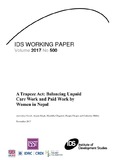A Trapeze Act: Balancing Unpaid Care Work and Paid Work by Women in Nepal
| dc.contributor.author | Ghosh, A | |
| dc.contributor.author | Singh, A | |
| dc.contributor.author | Chigateri, S | |
| dc.contributor.author | Chopra, D | |
| dc.contributor.author | Müller, C | |
| dc.coverage.spatial | Nepal | en |
| dc.date.accessioned | 2017-11-08T14:58:06Z | |
| dc.date.available | 2017-11-08T14:58:06Z | |
| dc.date.issued | 2017-11 | |
| dc.identifier.citation | Ghosh, A.; Singh, A.; Chigateri, S.; Chopra, D. and Müller, C. (2017) A Trapeze Act: Balancing Unpaid Care Work and Paid Work by Women in Nepal, IDS Working Paper 500, Brighton: IDS | en |
| dc.identifier.isbn | 978-1-78118-401-1 | |
| dc.identifier.issn | 2040-0209 | |
| dc.identifier.uri | https://opendocs.ids.ac.uk/opendocs/handle/20.500.12413/13338 | |
| dc.description.abstract | This working paper seeks to examine the relationship between unpaid care work and paid work that women in low-income households in Nepal perform, and whether, and if so how, they are able to maintain a balance between the two. It also examines the causes and consequences of the double burden on the physical and emotional wellbeing of women and their children. Further, the paper aims to create knowledge about how different stakeholders such as family, community, employers and state can contribute to women’s economic empowerment such that their economic empowerment is optimised (women’s entry into paid work is enabled without deepening their time poverty or worrying about the quality of care received by their family), shared (across generations, so that other women/girls in the family are not left to bear the burden of care) and sustained (such that the quality of care provided to children improves as a result of their mother’s paid work). By examining women’s participation in two economic empowerment programmes – the Enterprise Development Programme (EDP) in Surkhet district and Karnali Employment Programme (KEP) in Jumla district – it also provides policy inputs on how women’s economic empowerment (WEE) policy and programming can generate a ‘double boon’: paid work that empowers women and provides more support for their unpaid care work. | en |
| dc.description.sponsorship | UK Department for International Development | en |
| dc.description.sponsorship | International Development Research Centre (IDRC) | en |
| dc.description.sponsorship | Hewlett Foundation | en |
| dc.language.iso | en | en |
| dc.publisher | Institute of Development Studies | en |
| dc.relation.ispartofseries | IDS Working Paper;500 | |
| dc.rights | This is an Open Access paper distributed under the terms of the Creative Commons Attribution Non Commercial 4.0 International licence, which permits downloading and sharing provided the original authors and source are credited – but the work is not used for commercial purposes. http://creativecommons.org/licenses/by-nc/4.0/legalcode | en |
| dc.rights.uri | http://creativecommons.org/licenses/by-nc/4.0/ | en |
| dc.subject | Gender | en |
| dc.subject | Work and Labour | en |
| dc.title | A Trapeze Act: Balancing Unpaid Care Work and Paid Work by Women in Nepal | en |
| dc.type | IDS Working Paper | en |
| dc.rights.holder | Institute of Development Studies / The Institute of Social Studies Trust (ISST) | en |
| dc.identifier.team | Governance | en |
| rioxxterms.funder | Default funder | en |
| rioxxterms.identifier.project | Default project | en |
| rioxxterms.version | VoR | en |
| rioxxterms.funder.project | 9ce4e4dc-26e9-4d78-96e9-15e4dcac0642 | en |
Files in this item
This item appears in the following Collection(s)
-
Balancing unpaid work and paid work [20]
Explores the successes, challenges and lessons for Women’s Economic Empowerment programmes and policies -
IDS Research [1661]
Except where otherwise noted, this item's license is described as This is an Open Access paper distributed under the terms of the Creative Commons Attribution Non Commercial 4.0 International licence, which permits downloading and sharing provided the original authors and source are credited – but the work is not used for commercial purposes. http://creativecommons.org/licenses/by-nc/4.0/legalcode


